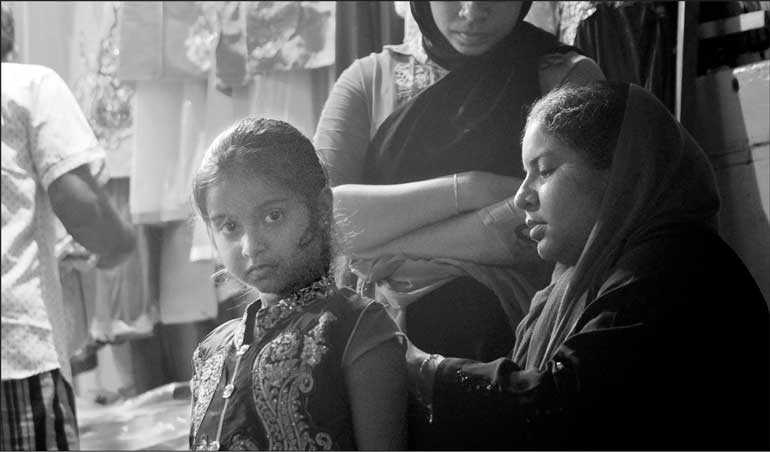Wednesday Feb 18, 2026
Wednesday Feb 18, 2026
Saturday, 16 February 2019 00:10 - - {{hitsCtrl.values.hits}}

Muslim women of the era when the ‘madhahib’ (plural for ‘madhhab’) derived their ‘fiqh’ laws in relation to marriage and divorce are not the women of today. Today, they are more educated, more independent, more professional, and therefore they are a significant component of the nation’s labour force. They are not a piece of property to be protected and sold – Pic by Shehan Gunasekara
 It is 10 years since Justice Saleem Marsoof (JSM) and his committee was appointed to review and make recommendations to reform the Muslim Marriage and Divorce Act (MMDA), passed originally in 1951 and amended in 1954, 1955, 1965 and 1969 before becoming Law No. 45 in 1975. Neither in drafting the original Act nor in its subsequent amendments Muslim women were ever consulted. It was all a male affair.
It is 10 years since Justice Saleem Marsoof (JSM) and his committee was appointed to review and make recommendations to reform the Muslim Marriage and Divorce Act (MMDA), passed originally in 1951 and amended in 1954, 1955, 1965 and 1969 before becoming Law No. 45 in 1975. Neither in drafting the original Act nor in its subsequent amendments Muslim women were ever consulted. It was all a male affair.
The need for further reforms to the Act in order to reflect the changing status of Muslim women in Sri Lanka arose, because an articulate, educated and professional class among them, demanded such reforms but within the parameters of a progressive Islam. This is a novelty. The tragedy however, is the lack of adequate representation of Muslim women in the final stages of consultation.
The 7 February meeting attended by ACJU, Muslim politicians and an intruder YMMA (the community still doesn’t have YWMA) are all men claiming to speak on behalf of women. Justice Minister Thalatha Athukorale has conveniently passed the buck to Muslim politicians to decide, and none of those politicians would dare challenging ACJU. This is the dilemma Muslim women are facing at the moment. ACJU, the unchallenged guardian of prevailing orthodoxy, is not going to allow equal status for women in the affairs of marriage, divorce and disputes arising out of it.
ACJU’s intellectual fortress is built with bricks of ‘shari’a’, ‘fiqh’ and ‘madhhab’. Is this fortress that impregnable for modern ideas on women, marriage, divorce and family to enter and reshape its structure? Historically speaking there had been a creative tradition in Islam of discursiveness, disagreements, controversies and compromises in shaping those bricks and that tradition is not closed except in the minds of ACJU hierarchy.
Muslim women of the era when the ‘madhahib’ (plural for ‘madhhab’) derived their ‘fiqh’ laws in relation to marriage and divorce are not the women of today. Today, they are more educated, more independent, more professional, and therefore they are a significant component of the nation’s labour force. They are not a piece of property to be protected and sold.
An intentional reading of the Quran and researches by erudite Muslim women about the actual status accorded to them in Islam is totally contradictory to what the guardians of orthodoxy are advocating. Had ACJU been a forward looking institution changes to the fiqh would have originated much earlier from within that apex body. Unfortunately its retrogressive outlook and intellectual stagnation have forced the demand for reforms to come from outside.
An intentional reading of the Quran and researches by erudite Muslim women about the actual status accorded to them in Islam is totally contradictory to what the guardians of orthodoxy are advocating. Had ACJU been a forward looking institution changes to the fiqh would have originated much earlier from within that apex body. Unfortunately its retrogressive outlook and intellectual stagnation have forced the demand for reforms to come from outside
The JSM report after long gestation has come out with a few progressive recommendations especially in regard to raising the marriageable age, consent of bride before marriage is contracted, stricter conditions on polygamy, women registrars of marriage, and abolition of dowry. Although these recommendations fall short of what is required to respect the human rights of women and equality of their status, yet JSM and the committee deserve to be congratulated for what they have come out with. The role of the six women members in that committee deserves special mention.
Instead of acting on the recommendations and legislating in Parliament a suggestion was made on 7 February to translate the report in Tamil and circulate it widely. Why now and before legislating? The answer is clear. It is to cause further delay by creating more controversy. It will be interesting to see what the responses not only from the community of ‘ulema’ but also from others after reading the Tamil translation.
No two members of the ulema community, as found out by Justice Muneer in Pakistan in 1954, agree on anything. (I strongly recommend Muslim activists to read that report where Justice Muneer states that no two ulema agreed even on the definition of a Muslim.) When such conflicting views and reactions arise after circulating the report that may call for further discussion involving further delay. The hidden agenda to sabotage the report is shocking, to put it mildly.
In an election year neither the Minister of Justice nor the Muslim parliamentarians are going to antagonise a powerful Muslim group like ACJU by ignoring its wishes. The only option to Muslim women is to form a broader coalition of sympathetic voices and continue agitating. It is surprising that even a progressive intellectual group like the Kandy Forum is keeping silent on this matter. As one writer put it “Women are the Future of Islam”.
(The writer is attached to the School of Business and Governance, Murdoch University, Western Australia.)